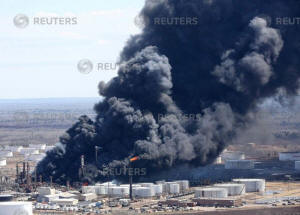|
U.S. probe cites 'ineffective' safeguard
in Husky oil refinery blast
 Send a link to a friend
Send a link to a friend
 [December 13, 2018]
By Erwin Seba [December 13, 2018]
By Erwin Seba
HOUSTON (Reuters) - An "ineffective"
safeguard failed to prevent an explosive mixing of air and fuel at a
Husky Energy refinery in Superior, Wisconsin, leading to a blast and
fire in the plant's gasoline-producing unit in April, a U.S. industrial
safety group said on Wednesday.
Air seeped through a hole in a valve within a fluidic catalytic cracking
unit (FCCU), the U.S. Chemical Safety Board (CSB) said, causing an April
26 explosion that led to a massive fire and a 24-hour-long evacuation of
residents living within miles of the plant.
The board said 36 people sought medical treatment after the blast,
including 11 working at the refinery. The plant was undergoing
maintenance at the time.
Husky, according to the CSB, had only considered a failure of the valve
when locked open, not a failure when it was closed, according to an
updated report the board presented of its months-long investigation at a
meeting in Superior.
The failures leading to the Superior refinery explosion were similar to
those that caused a 2015 explosion in an FCCU at a Torrance, California,
refinery then owned by Exxon Mobil Corp. Exxon sold the refinery to PBF
Energy in 2016.

"Prior to both incidents, the process hazard analyses identified
scenarios in which hydrocarbons flowed into the air side of the FCCU and
vice versa due to a failure of the spent catalyst slide valve (SCSV),
but the safeguards listed to protect against those scenarios were
ineffective," the board said.
Husky did not dispute the CSB's finding, and will continue to work with
the board while it conducts its own investigation into the explosion,
said spokesman Mel Duvall.
The CSB's "investigation is important to understanding what happened,"
Duvall said. "We are also continuing with our own investigation."
The CSB, created by the U.S. Clean Air Act, has no regulatory or
enforcement authority but is charged with determining the causes of
chemical plant explosions and fires and making recommendations to
government and industry.
[to top of second column]
|

Dark smoke rises from Husky Energy oil refinery following an
explosion in Superior, Wisconsin, U.S., April 26, 2018.
REUTERS/Robert King/Duluth News Tribune

"Given the similarities between these two incidents, the CSB will be
examining areas of further improvement that need to be taken by
industry," the board said.
FCCUs use a fine, silica catalyst in high heat to make gasoline from
gas oil and the passage of the sand-like catalyst over the slide
valve at the Superior refinery wore a hole in it.
A mixture of air and hydrocarbon within the unit can easily find an
ignition source in the 1,300 degree Fahrenheit (715 Celsius)
operating temperature of the FCCU.
"While we donít expect to resume normal operations at the refinery
until 2020, we remain committed to our employees and the community,"
Duvall said.
Duvall said the company is reviewing alternatives to hydrogen
flouride as it prepares to rebuild the refinery for restart in 2020.
(Reporting by Erwin Seba; Editing by David Gregorio)
[© 2018 Thomson Reuters. All rights
reserved.]
Copyright 2018 Reuters. All rights reserved. This material may not be published,
broadcast, rewritten or redistributed.
Thompson Reuters is solely responsible for this content.
 |